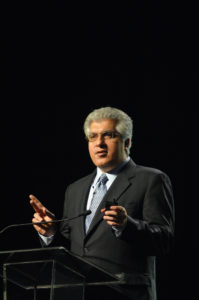Fed Will Raise Interest Rates, GSU Expert Predicts
 ATLANTA-The Federal Reserve is expected to raise interest rates at its December meeting and the surprise of President-elect Donald Trump will not change that, according to Rajeev Dhawan of the Economic Forecasting Center at Georgia State University’s J. Mack Robinson College of Business.
ATLANTA-The Federal Reserve is expected to raise interest rates at its December meeting and the surprise of President-elect Donald Trump will not change that, according to Rajeev Dhawan of the Economic Forecasting Center at Georgia State University’s J. Mack Robinson College of Business.
“Given the language in the Federal Open Market Committee statement, expectations for a December hike are very much on the table. They used the phrase that the case for a rate hike has ‘continued to strengthen,’ which signals an imminent move,” Dhawan wrote in his quarterly “Forecast of the Nation,” released today (Nov. 16).
“Looking at the election reaction of the 10-year bond market, a December hike is still very much in the cards,” he said.
Dhawan said the economic policies Trump offered during campaign season completely disregarded fiscal deficits and national debt levels.
“Given the promises of no spending cutbacks, we may actually see a rise in spending, which will keep the fiscal deficit rising and put more upward pressure on interest rates,” Dhawan said.
Trump also campaigned against trade deficits. His 100-day plan after taking office includes renegotiating NAFTA and other types of trade partnerships.
“What sets Trump apart from others is his view on trade deficits, in that they are bad, period,” Dhawan said. “And his solution is to impose tariffs, which he can do unilaterally because the Trade Act of 1974 gives him fast-track authority to place tariffs for up to 150 days without congressional approval.”
Dhawan believes these tariffs would be temporary but would cause a sharp rise in the dollar index, producing a steep climb in bond and mortgage rates, all of which would bite into interest sensitive purchases such as housing and vehicle sales.
“Consumers’ retirement portfolios, the only liquid option they have these days, would take a nasty hit, forcing them to pull back further on big ticket spending,” Dhawan said.
Growth will be subdued in mid-2017 as this tariff drama plays out. Once it’s over by early 2018, growth will rebound to 2.0 percent, he said.
Dhawan expects these same issues to affect Georgia. Slow investment growth and a strong dollar due to tariff-strained international relationships will damage the Peach State’s export capabilities. Georgia’s employment growth is going through a swoon, with only 12,600 new jobs added in the third quarter of this year. After growing by 86,700 new jobs in 2016, the forecaster anticipates weaker than normal job growth of 54,300 new jobs in 2017. Growth will become stronger in 2018 as the tariff drama ends, with 72,200 jobs added that year.
“The main sectors to feel the pinch will be manufacturing and corporate, specifically large companies with international ties,” said Dhawan. “The government sector will remain basically the same, due to the need for local government spending. Other service sectors will improve because those who cannot find work in, say, the corporate sector, will find temporary employment as your Uber driver or pizza-delivery person. This shift from higher-income positions to lower-earning ones will result in somewhat less stellar personal income growth in 2017 and 2018, after 5.0 percent growth in 2016.”
The healthcare and technology sectors of Georgia and metro Atlanta will soldier on as domestic demand factors remain favorable, which also will benefit small business, he said.
Dhawan said metro Atlanta, especially housing, will be affected by the same effects.
“A downgrade in personal income growth will affect the number of housing permits in Atlanta,” Dhawan said. “Higher interest rates will bite into the amount of total housing permits in 2017, causing a 12.7 percent drop, with a decline of 32.6 percent in multifamily and 1.8 percent in single-family permits.”
Higher interest rates will force home buyers towards the outer suburbs.
“We will see a shift in home sales from the core counties of the metro area toward the outer regions, as higher interest rates force those who can still qualify for a mortgage into cheaper areas,” Dhawan said.
Highlights from the Economic Forecasting Center’s National Report
- GDP grew 2.9 percent in the third quarter of 2016. It will expand at 1.5 percent in 2016, 1.6 percent in 2017 and 1.9 percent in 2018.
- Business investment declined 0.6 percent in the third quarter of 2016 and will drop 0.4 percent for the year. Expect a rebound to 1.7 percent growth in 2017 and 3.2 percent in 2018. Jobs will grow by a monthly rate of 182,700 in 2016, 136,900 in 2017 and 156,300 in 2018.
- Housing starts will average 1.154 million units in 2016, drop to 1.130 in 2017, then rise to 1.181 in 2018. Auto sales will be 17.2 million units in 2016, 16.1 in 2017 and 15.3 in 2018.
- The 10-year bond rate will rise to 2.2 percent by the end of 2016 and inch up to 3.5 percent in 2018.
Highlights from the Economic Forecasting Center’s Report for Georgia and Atlanta
- Georgia employment will gain 86,700 jobs (15,300 premium jobs) in calendar year 2016, 54,300 jobs (9,600 premium) in 2017 and 72,200 (13,400 premium) in 2018.
- Nominal personal income will increase 5.0 percent in 2016, followed by only 4.7 percent in 2017, and a better 5.1% in 2018.
- Atlanta will add 62,800 jobs (11,800 premium jobs) in calendar year 2016, 39,100 jobs (7,700 premium) in 2017 and 50,400 jobs (10,300 premium) in 2018.
- Atlanta permitting activity in 2016 will increase 17.8 percent, drop by 12.7 percent in 2017 and fall slightly in 2018.
